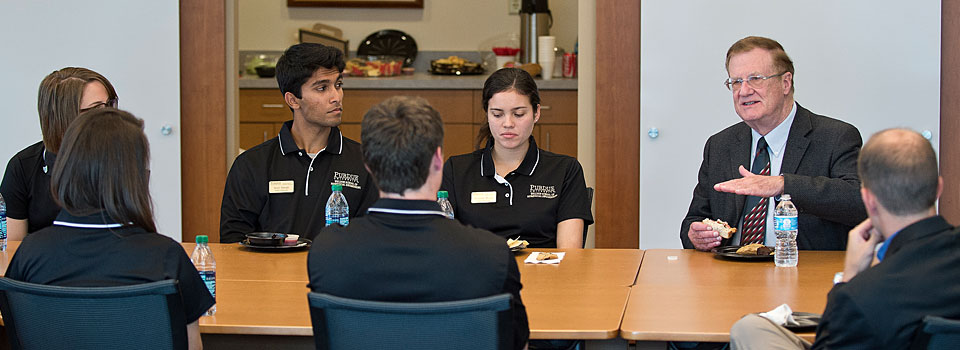Norm Weldon: A lifetime of achievement
Norm Weldon: A lifetime of achievement
| Author: | Della Pacheco |
|---|---|
| Magazine Section: | Always |
| College or School: | CoE |
| Article Type: | Issue Feature |
| Feature Intro: | Norman Weldon knows a thing or two about success. A serial entrepreneur, he has started 17 medical device companies, selling nine for substantial profit. |
In 2004, the Weldon family provided a $10 million gift to transform the Purdue biomedical engineering department into a full-fledged school. The school was named the Weldon School of Biomedical Engineering in honor of the family's gift. Building upon Weldon's experiences, the rapidly growing school is already well-recognized as a leader in translating life-saving technologies into clinical practice via industrial partners.
Weldon received the 2012 Phoenix Lifetime Achievement Award in October during the annual Medical Device and Diagnostic Conference for Chief Executive Officers in Laguna Beach, Calif. The award is given annually to individuals in recognition of outstanding achievement in the medical device and diagnostic industry.
"The Phoenix Lifetime Achievement Award goes to an individual who has made a significant contribution over the course of their career to advance medical technology as an innovator or entrepreneur," says David Cassak, managing director of medical devices for Elsevier Business Intelligence. "Norm's career obviously exemplifies that. The work he has done building and mentoring small companies has made him a leader in the medical diagnostics field."
Weldon has 48 years' experience in senior management in the medical device and electronics industries. He has been CEO of CTS Corp., in Elkhart, Ind., and president of Cordis Corp., in Miami. He currently is managing director of Partisan Management Group, a venture capital fund he co-founded in 1992. From 1986 to 1996, he was president and CEO of Corvita Corp., a medical device company he co-founded in 1986. Pfizer Inc. purchased the company in 1996.
"To receive a lifetime achievement award at my young age of 78 is a bit premature," quips Weldon. "Most of my best achievements are still ahead. The best is yet to come."
The road to entrepreneurship
Weldon earned a bachelor's degree in agriculture in 1956, a master's degree in management in 1962 and a doctoral degree in economics in 1964, all from Purdue. He entered the medical device industry at the age of 45 and became an entrepreneur at 54.
His biggest regret? Not getting into the medical device industry earlier. "I had one year of experience 15 times in electronics," Weldon says of his time in that industry. "In the medical device industry there are no repeats."
He advises graduating biomedical engineering students who want to be entrepreneurs to earn an MBA and work in a large company for five years — no longer.
"It's easier to take the risks of entrepreneurship when you're young with no children or later in life," he says.
So what does it take to be successful? Weldon says to "constantly read and absorb every technical detail in the industry and know the information cold. Understand technical and financial dynamics of the industry."
Putting together diverse teams with strengths in many areas is key for a startup venture. He always employs engineers at every level: sales and marketing, manufacturing and regulatory issues.
"In the medical device field you have to keep learning," Weldon says. "The people who get the most satisfaction from working in this field aren't those who make the most money. Sometimes the money is a burden. You have to decide what to do with it like endow a school like our family did."
He enjoys mentoring students and returns to campus often to meet with the Weldon School of Biomedical Engineering ambassadors, where much of an informal discussion over lunch centers on Weldon's tips for entrepreneurial success.
His parting advice to the next generation of biomedical engineers: "You're in the right field. Keep learning. Read the paper. Go to the trade shows. Talk to the gray hairs, and pay attention."

Comments